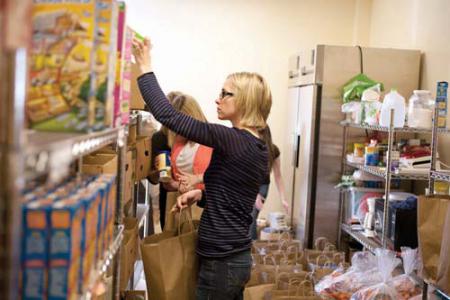October 24, 2013
 Food Pantry: A volunteer from Select Restaurants bagged groceries at Catholic Charities’ Yawkey Center Food Pantry in Dorchester recently. Photo by Suzanne Ouellette
Food Pantry: A volunteer from Select Restaurants bagged groceries at Catholic Charities’ Yawkey Center Food Pantry in Dorchester recently. Photo by Suzanne Ouellette
As Thanksgiving nears, Catholic Charities Archdiocese of Boston (CCAB) is hoping it can help everyone to enjoy a bountiful meal.
The agency, which runs six food pantries in Massachusetts, including three in Boston and one in Dorchester, is one month into their Friends Feeding Families Campaign and has already raised over $30,000 in sponsorships. Their goal for the three-month effort is $1 million.
The campaign calls on community members to donate food or funds to help feed individuals and families in need. The Yawkey Center on Columbia Road is the charity’s largest food pantry, and serves 40,000-50,000 people annually.
The now-annual fundraiser began in 2008 when, after the start of a nationwide recession, CCAB saw a sharp rise in demand at their food pantries.
“We knew there were people really struggling,” said Debbie Rambo, CCAC president. “The number of people coming to our food pantries started to sky-rocket.”
Rambo says the recession continues to burden families, and the numbers agree. Rambo reports that in 2008 just before the recession, the Yawkey Center pantry distributed about 5,000 lbs of food per month. By the end of that year it was distributing 10,000 lbs per week, a 400 percent increase. Today, Rambo says the center distributes about 15,000 lbs per week.
The Friends Feeding Families campaign was started to support the growth in distribution and relieve new financial pressures on individuals and families who had recently slipped out of the middle class. Since its inception it has raised more than $3.5 million in sponsorships.
Even so, the charity continues to struggle to keep pace with demand.
“Frankly, there are some days when there are more people than there is food,” said Rambo.
She explains that many of those served are working families who struggle to make ends meet as they recover from the disruptive recession. “They may be working at jobs that are different from the jobs they were working in 2008, they’re probably working fewer hours, and their hourly wage is probably lower.”
Rambo says the contingent served is diverse, coming from a wide range of racial, cultural, and religious backgrounds. When asked about the religious affiliation of the Charity, she stressed openness: “We serve anyone and everyone. We don’t ask if you’re Catholic, we only ask if you’re hungry.”
Rambo says communities in which CCAB operates have been extremely supportive of the effort to feed those in need. The food pantries are run in part by volunteers, many of whom used to be donors, according to Rambo. She said that some donors from previous years have now come to need the service, which testifies to the negative effect of the recession.
Asked how difficult it has been to rally support for the growing charity, Rambo credits communities for rising to the challenge: “We certainly have made a call to action, but I think people have been very generous. Especially during the recession when people were cutting back on their charitable giving… it was compelling enough for people to give either food or money for food for friends and neighbors that didn’t have enough.”
Ken Binder, VP of development for CCAB, agrees that it is due to great generosity that the charity has been able to expand so much. “Our donors, friends, volunteers, have really stepped up to do whatever they can to assist our neighbors,” Binder said. He reports that donors have offered to host fundraising parties even after the fundraiser officially ends, and that a desire to contribute is widespread.
Both Rambo and Binder take for granted that meeting such a basic need as hunger should be a priority, and they feel that their peers in Massachusetts agree.
“The sense that all of us are sometimes just one paycheck away from being just as vulnerable as the person next door, I think resonates with everyone in the community,” Rambo said.
“It’s the holidays, and people are trying to feed their families and have a wonderful thanksgiving… people see that need and they’ve been very, very generous,” said Binder.
Topics:


